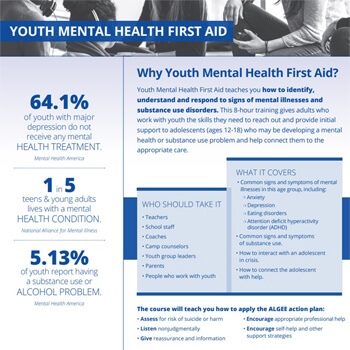Youth Mental Health First Aid

For youth growing up across the country, it’s an ever-changing environment filled with mental and physical transformation.
By: Jaime Lederer, MSW, MPH, Community Health Improvement.
Where you sit reflects what you see. Our personal context and viewpoint define how we see the world, what actions we take each day and the way we see others. For youth growing up across the country, it’s an ever-changing environment filled with mental and physical transformation.
Mental health challenges impact the growth and development of young people. Many youth struggle with some sort of anxiety or stress on a daily basis. It’s a natural part of life to feel a little nervous before new social situations, school homework, or sports games as friends and family look on. However, when these feelings of stress, depression, sadness or anxiety prevent or hamper daily life there might be something else going on.
According to the National Alliance for Mental Illness, nearly 20% of adults experience some sort of mental illness across their lifetime. Furthermore, one in six U.S. youth aged 6-17 experience a mental health challenge nationally each year. Mental health challenges include ADD, ADHD, anxiety, bipolar, depression and substance use, to name a few.
Through funding from the Substance Abuse and Mental Health Services Administration (SAMHSA), the Community Health Improvement (CHI) Department at Cambridge Health Alliance is offering Mental Health First Aid (MHFA) training for the community. The curriculum offers two pieces of training - one focused on adults and another developed to assist youth. Since receiving funding in October 2018, over 400 advocates have been trained. People in attendance have included community-based agency staff who have direct contact with youth, parents/caregivers, teachers and school personnel, and health care staff to help equip them with the tools to identify and assist youth facing mental health crises.
Similar to first aid and CPR, MHFA is a national certification and early intervention program. Trainees learn a set of tools to assist youth in both crisis and non-crisis situations. The training is eight hours in length and consists of lecture time and class exercises where students draw a typical youth and discuss their challenges, link disorders with associated definition and apply the MHFA Action Plan in scenarios. It also provides attendees with language to discuss mental health and reduce the stigma that prevents many from talking about it. This is critical for so many reasons and important for supporting our diverse communities.
What do you learn at MHFA training?
One important takeaway from the course is the MHFA Action Plan or “ALGEE.” ALGEE stands for:
- Assess for risk of harm to self or others.
- Listen without judgment.
- Give reassurance and information.
- Encourage appropriate professional help.
- Encourage self-help and other support strategies.
CHA offers MHFA training in partnership with community agencies and collaborations in the region, including local police and school departments, faith communities and Bunker Hill Community College. Through this training, members of the community are equipped with knowledge and information on how to best support others, where to turn to for help and key resources available including crisis response teams, hotlines, treatment and recovery supports, and more.
We know that some mental health challenges develop during adolescence, but we also know that many people are unaware of how to help, and youth often do not know where to turn. Through this engaging training, our communities will have more caring adults equipped with the tools and resources necessary to provide a caring, non-judgmental approach to assist at an important time and help youth navigate the world.
Disclaimer
This articles provide general information for educational purposes only. The information provided in this article, or through linkages to other sites, is not a substitute for medical or professional care, and you should not use the information in place of a visit, call consultation or the advice of your physician or other healthcare provider.